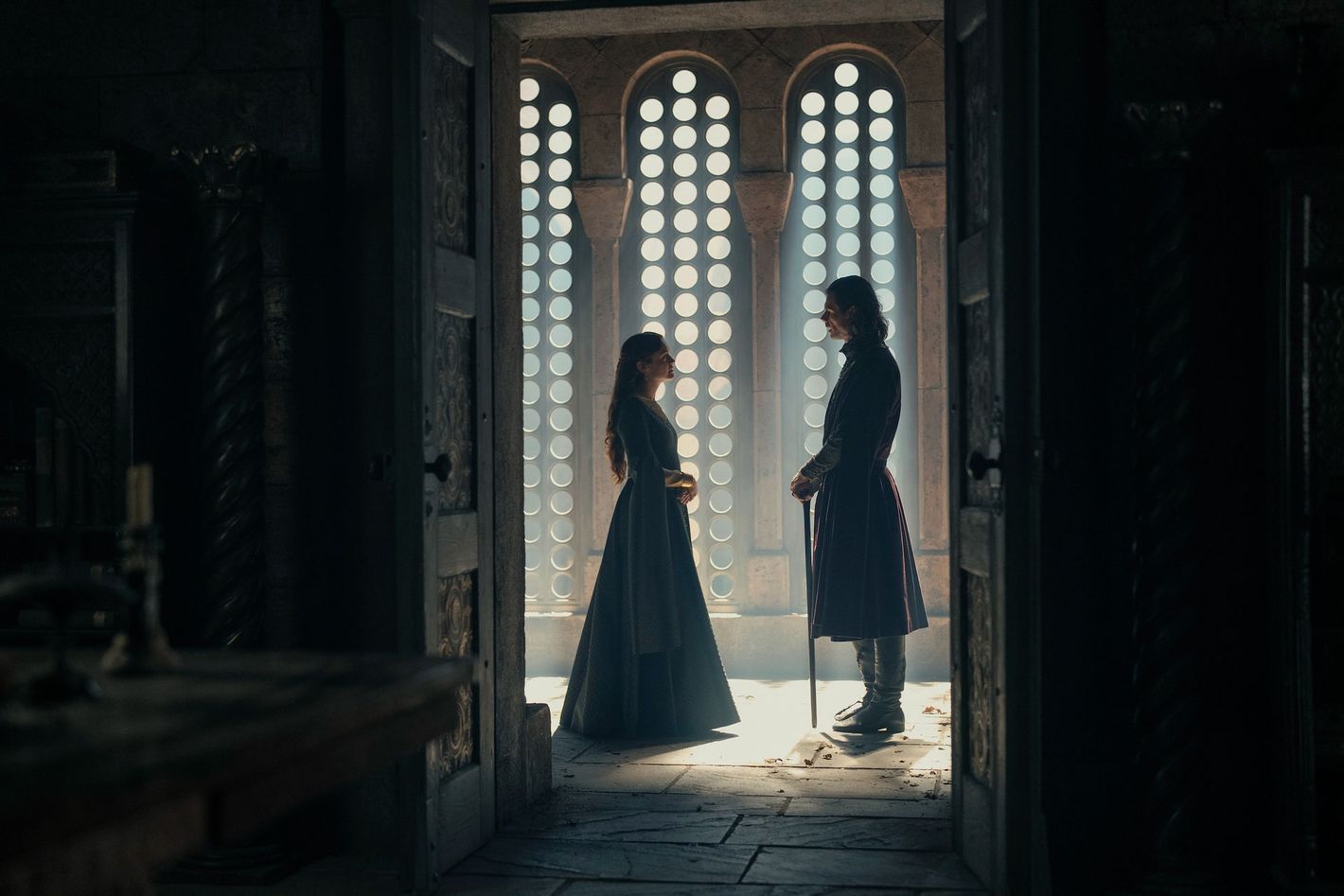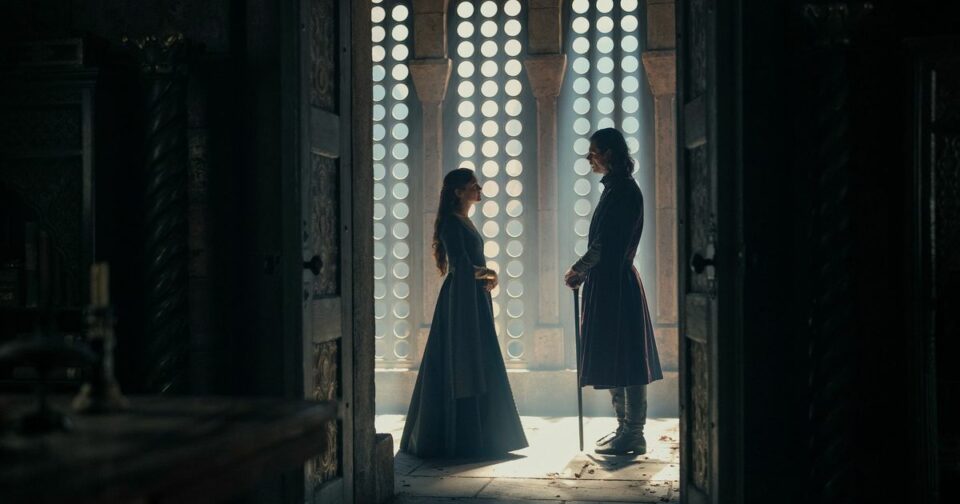[ad_1]

Want to watch House of the Dragon with us? Sign up for our new subscriber-exclusive newsletter obsessively chronicling season two.
Between the first and final episodes of House of the Dragon season one, two decades pass, the years ticked off by discombobulating cast changes and the slow wearing out of Viserys’s mortal coil until the king drops dead (somehow still suddenly). If you can believe it, we watched that happen 20 human months ago.
Between then and the premiere of season two, five Westeros minutes appear to have elapsed. In the season-one finale, Aemond One-Eye strikes his nephew from the sky, and in the season-two premiere, it seems Lucerys Velaryon’s body has just hit the churning waters of Shipbreaker Bay. What was once the story of House Targaryen evolving into enemies over a generation is now a show about who these people are in this one turbulent moment. Aegon versus Rhaenyra. Green versus Black. Dragon versus dragon.
But in a table-setting move that signals an expansion of the storytelling field, the new season opens neither in King’s Landing nor Dragonstone. I let out a gleeful hoot when the image of a raven soaring o’er mountain lakes gave way to voice-over in a Northern accent. Because no matter how much time this series spends down in the Crownlands, home is where the heart is, and that’s Winterfell. How refreshing it is to be, however briefly, beyond the realm of palace intrigue and standing on the Wall among men of principle. The narrator, revealed to be Ned’s great-great-great-great grandfather Cregan Stark, extemporizes about duty — a concept as foreign to House Targareyan as the hazards of inbreeding.
If you’ll recall from a year and a half ago when the last episode of our little dragon show aired, Queen Rhaenyra has dispatched her eldest son Jacaerys to shore up support for her royal claim. Now, he’s finally arrived to receive Cregan’s tepid reply. The Black Queen can have a few thousand graybeards, but not his more robust fighters, who are needed to fend off dangers from the North when winter falls. “Wildlings and weather,” as Jacaerys puts it, but Cregan gently corrects him. What lies beyond the Wall is death itself; what happens down south, by comparison, is parlor games.
The first quarter of the season premiere proceeds at this easy rhythm: vista followed by tête-à-tête, each deftly threaded with critical information you may have forgotten. Winterfell, then Dragonstone, and finally Driftmark. Back at Team Black HQ, a restless Daemon “commands” Princess Rhaenys to fly with him to King’s Landing to kill Vhagar and Aemond. “A son for a son,” he tells her. It’s simple, retaliatory math that recalls Alicent’s season-one demand following Lucerys’s maiming of Aemond — “an eye for an eye.” But Rhaenys is tired from patrolling Blackwater Bay on dragonback, and she doesn’t answer to Daemon anyway.
The conflict between them is a holdover from last season. Rhaenys (correctly) believes her cousin to be ambitious and impetuous. She knows Rhaenyra hasn’t authorized this revenge plot, because Rhaenyra is alone in the Stormlands, searching for what remains of her baby boy’s sea-torn body. For his part, Daemon considers Rhaenys insufficiently loyal; her knee is bent, but how deeply? If she’d incinerated Team Green in season one when she had the chance, Luke would be alive, or so the counterfactual guilt-tripping goes.
And at High Tide, Corlys the Sea Snake chitchats with Alyn about the state of their navy, which returned from the Stepstones’ rough waters in rough shape. The conversation seems to serve two purposes. First, to introduce the character of Alyn, who saved the Sea Snake’s life. Second, to remind us of the Blacks’ strategy of blockading the Gullet — that vast stretch of dark water separating the Narrow Sea from Blackwater Bay and, beyond it, the ports of King’s Landing. The outlook, though, is not so bueno. They don’t have enough seaworthy ships. With Luke dead, Driftmark has no heir.
House of the Dragon is a very intentional series but generally not a subtle one. If a character we’ve barely seen is suddenly being mentioned conspicuously by name, like Alyn, then we should prolly pay attention. If someone who has hardly spoken a line, like Aegon’s sister-wife, Helaena, is allowed the screen time to voice a concern, it demands to be heeded. Viserys took 20 years to die, yes, but most Dragon subplots resolve themselves in the same episode they’re introduced. If Helaena is afraid of “the rats” — whatever that means — everyone should listen the fuck up.
And once she utters the word rats, the idea is everywhere. There are the literal rats that scurry down the castle halls and the rats employed by Otto Hightower to spy on his own daughter. There are literal ratcatchers setting traps in the Red Keep and ambitious men like Larys Strong, who exterminates Otto’s rats only to replace them with his own. At times, Alicent is as much of a pawn as Aegon. When she finally appears, Rhaenyra’s jilted lover, Ser Criston, is going down on her (so that’s still happening), though both should be at Aegon’s small council meeting by now. Otto notices them enter together, but the indiscretion is upstaged by Aegon arriving with wee Jaehaerys in tow. It’s take-your-heir-to-work day.
The ratio of chat to dragons is less than ideal in “A Son for a Son,” but some important scorekeeping is presented at the small council. The Starks and the Vale still haven’t declared for Aegon II (nor will they). House Baratheon is Team Green thanks to the marriage pact Aemond brokered last season. In the Westerlands, Golden Tooth is expected to declare for “Aegon the Magnanimous” — one of several “man of the people” monikers his team is trial-ballooning. And more Hightowers are marching south from Oldtown. Alicent is not usually a dope, yet she’s earnestly hopeful that Rhaenyra might accept Aegon’s terms for surrendering the throne, as well as a bouquet of apologies for the brutal murder of her second son.
Otto is more sensible. War is the only option, which requires supplies, and supplies require Aegon to break Rhaenyra’s blockade, which requires a navy. Maybe Greyjoy could be enticed to clamber aboard Team Green if named Master of Ships? House Tully, too, has yet to declare. Ring the alarm: Harrenhal will absolutely feature prominently in the civil war to come, because neither Daemon nor Aemond, which I just noticed is an anagram of Daemon, will stop blathering about gaining a “toehold” in the Riverlands. (HBO should really send every subscriber a map.)
So what’s Aegon like as a king? A mixed bag. He attempts to humiliate Tyland Lannister by making the Master of Coin give his mischievous toddler a “pony” ride mid-cabinet meeting. On the other hand, everyone hates a Lannister. Perplexingly, Aegon believes the Greens can win the Dance of the Dragons with dragons alone despite the other side having more dragons. He’s lacking in strategic foresight or at least bad at dragonmath. But Aegon keeps Aemond close, which is shrewd. War may not be his specialty, but he demonstrates interest in the sociopolitical side of ruling. He wants to address the difficulties that the smallfolk are facing in the run-up to war. He’d at least like to be adored if that’s not too much to ask. “Aegon the Generous”? It has a certain ring to it if only Grandpa Otto would stop souring his populist vibe at court.
Alicent picks the wrong ally in Otto. She and her father are on Aegon’s one shoulder, pleading with the king not to let the promise of war devolve into “wanton” violence. She’s convinced her son will listen to her, up until he gets bored of playing king and lets her run the show. But on Aegon’s other shoulder sits Larys, who is already poisoning the young king against the Hand. Doesn’t he want someone younger and hipper by his side? He’s joined by Criston, who still hasn’t gotten over what went down with a teenage Rhaenyra, and the bloodlusty Aemond, who may be the only person in King’s Landing who doesn’t realize his bestie is doing his mom.
On the other side of the board altogether is Queen Rhaenyra. When we finally see her, she’s dirt-smeared with red-rimmed eyes. She looks brittle and heartbroken but still formidable. She sobs on the shores of Storm’s End, clutching her son’s washed-up cloak. She returns to Dragonstone to light Luke’s funeral pyre and give her orders. “I want Aemond Targaryen,” she declares. What it lacks in specificity, it makes up for in urgency.
Daemon is, of course, oh so keen to comply. He needs something to do besides blame everyone around him for Aegon’s coronation. Besides Rhaenys, he also finds time to blame Ser Arryk, the Kingsguardsman whose identical twin bro, Erryk, sided with the usurper. Daemon also blames the White Worm, who is found stowed away on a ship caught up in Black’s blockade. If she hadn’t found Aegon for his kin last season, maybe he wouldn’t be king? It’s thin as far as accusations go, but Daemon imprisons his ex all the same.
Rhaenyra’s call for vengeance sets off a sloppy sequence of events that sees one of the series’ most ethical characters (a low bar, to be sure) inadvertently responsible for one of the most evil and repugnant things I’ve seen on TV. In exchange for the names of men who will help him assassinate Aemond, Daemon offers the White Worm back the freedom he conveniently stole from her just a few scenes earlier. (Intentional, not subtle.) Rhaenyra’s uncle-husband sails for King’s Landing and finds Blood, a disgruntled guardsman, and Cheese, a (literal) ratcatcher of the Red Keep with debts that need paying. He proposes to pay these two bozos to kill the most accomplished fighter in King’s Landing. It has disaster written all over it, but perhaps that’s Daemon’s intention. “What if we can’t find him?” asks the (literal) exterminator. It’s not a rhetorical question, and I was sort of confused when the scene cut away without an answer. I would not be confused for long.
The bumbling assassins penetrate the Red Keep by way of the tunnels below and confidently stride through the throne room not 30 paces from Aegon himself. Surprise! When they eventually make it to the royal bedchambers, Aemond is nowhere to be found. Instead, Blood and Cheese find the nursery — a room we’ve visited once before in this episode, just before Aegon dragged Jaehaerys to the council meeting. What a rebellious Helaena said then still echoes from the brick walls: “What if he doesn’t want to be king?” (Intentional, folks, not subtle.)
Helaena is watching over her sleeping children when Daemon’s goons arrive and offer to spare her life and her daughter’s life in exchange for the head of the king’s heir. “A son for a son” is such gruesomely straightforward arithmetic. Helaena eventually complies, fleeing to find her mother as the men behead the child. It’s a mercy we don’t glimpse the crime, just hear it happening from behind the nursery partition.
Jaehaerys won’t be king or even have to make the choice Helaena dreaded. Now, no one on Team Green or Black will be compelled to sheath their swords for the greater good. There are no terms to be agreed on, no spheres of influence to be divvied between them. An “eye for an eye” will make the whole world blind, but “a son for a son” means certain war.
More From This Series
- House of the Dragon Scorecard: Bad Plan, Worse Execution
- House of the Dragon Season-Premiere Recap: Rat Race
- House of the Dragon’s Blood and Cheese Moment Should Have Been Nastier
[ad_2]
Amanda Whiting , 2024-06-17 04:00:17
Source link



